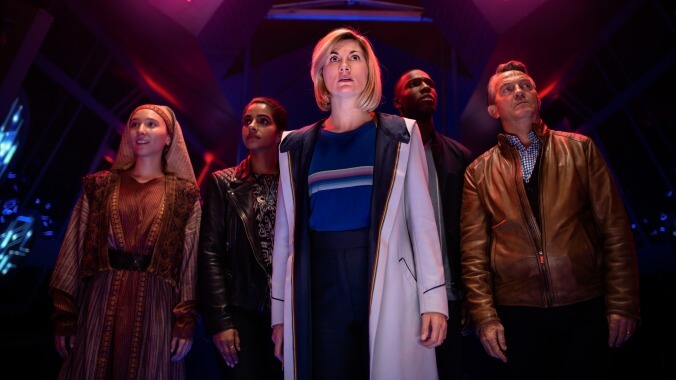Doctor Who is all over the map in an episode about mental health


“Can You Hear Me?” starts out incredibly promisingly. The episode opens in 1380 Aleppo, where a spunky young woman named Tahira (Aruhan Galieva) is being treated for mental health issues. The Doctor later notes that 14th century Islamic physicians were known for their enlightened treatment of mental health problems, and I kind of wish this had just been a historical episode about that topic. Particularly at a time when Aleppo is so associated with warfare and destruction, it’s wonderful to see a mainstream TV show celebrate the rich history of the region. Alas, Tahira winds up being a plot device at best and a nonentity at worst. You could remove her from this episode entirely and it would barely change a thing. Instead, “Can You Hear Me?” tries to combine spooky nightmare imagery, a serious discussion about mental health, and a heaping helping of ’90s camp. Unsurprisingly, that makes for a rather odd tonal mismatch.
Easily the most baffling choice “Can You Hear Me?” makes is to anchor its timely yet timeless story about mental health around antagonists who feel like they’re straight of the ’90s. Villainous, immortal nightmare gods Zellin (Ian Gelder) and Rakaya (Clare-Hope Ashitey) wouldn’t be out of place in an episode of Star Trek: The Next Generation or Buffy The Vampire Slayer. Perhaps the dated feeling isn’t entirely surprising, given that they’re tied to Classic Who villains the Eternals, the Guardians, and the Toymaker (Radio Times has an explainer on all that). But that doesn’t make up for how lackluster they are as a central threat.
The twist wherein Zellin tricks the Doctor into freeing Rakaya from her deep space prison just made me annoyed at the Doctor’s ridiculous lack of forethought. (She wasn’t kidding about blundering being at the top of her CV!) And though Zellin’s ability to detach his fingers and stick them in people’s ears is effectively creepy, it’s also kind of goofy, which, again, sits oddly with the episode’s more serious aims. The most interesting thing about the immortals is the animated sequence where we learn about their origin, which was a cool new storytelling technique for Doctor Who. It also immediately made me think of the opening sequence of the animated movie FernGully, so that’s yet another ’90s tie-in!
Ultimately, Zellin and Rakaya are just too campy a threat for an episode about humanity’s relationship to fear, anxiety, and mental health. That’s especially true of the big climatic scene where they… slowly walk down a street in Sheffield wearing off-brand X-Men Halloween costumes! Like so many of the villains this season, these theoretically unstoppable gods are dispatched ridiculously easily after the Doctor rambles a bit and then suddenly comes up with the perfect plan.
Where “Can You Hear Me?” does work is as an episode about the companions, which is a welcome addition for the Chris Chibnall era of the show. Yaz requests a visit home, which gives all three companions a chance to check in on life in Sheffield. And they soon become painfully aware of the ways in which time has slipped away while they’ve been traveling. Yaz’s sister Sonya lost a job and learned to cook. Meanwhile, Ryan’s best friend Tibo (Buom Tihngang) has been slipping into a bad mental state in the months since Ryan stopped responding to his texts.
Thanks to Zellin’s nightmare powers, Ryan, Yaz, and Graham are forced to confront their worst fears, many of which relate to the way traveling with the Doctor has changed their lives. In a welcome bit of continuity, Ryan is still haunted by the scorched Earth and Dregs of “Orphan 55,” as well as by his newfound fear of leaving his friends to face those problems alone. Graham, meanwhile, comes to realize he’s been repressing his anxiety that his cancer might return (not to mention his lingering grief over losing Grace). And Yaz begins to wonder if she’s moved past her rough teenage years or just reverted back to her old coping mechanisms.
Though the Yaz subplot is ultimately effective, it’s also a prime example of the way that an unnecessary mystery can dilute a story’s power. We eventually learn that a bullied, despondent teenage Yaz tried to run away from home before being saved by Sonya and the kindly police officer (Nasreen Hussain) she called to help. Yet the story is told in such an ominous, fragmented way that I kept waiting for a more dramatic shoe to drop. Did Yaz and Sonya have another sibling who died? Was the police officer a future version of Yaz who went back in time to help her younger self? None of that turns out to be the case. And while the scene where Yaz goes to thank her savior is a beautiful moment of emotional catharsis, it might’ve been better served by a more straightforward narrative.
Still, the flashback raises fascinating questions about Yaz’s decision to travel with the Doctor. Is it a healthy way for Yaz to manifest her desires or an unhealthy way to run away from her life? Ryan is the first of the fam to come to the realization that pretty much all Doctor Who companions come to at some point: It’s impossible to travel with the Doctor and still lead a normal life, even if she drops you off right where you left. Time is relative and you can’t maintain your relationships with your loved ones if you’re living at a different rate than they are. Eventually, you have to choose what kind of life you want (or else have that choice made for you—as has happened to many a companion). Though the TARDIS fam don’t come to any conclusions yet, it’s nice to see them grappling with interior problems rather than just exterior threats.
If the villains don’t work and the companions do, the part of “Can You Hear Me?” that’s a mixed bag is its treatment of mental health, and especially the way it equates mental health issues to fear and nightmares. Those ideas are related, of course, but for an episode that opens on a hospital renowned for its progressive mental health treatments,“Can You Hear Me?” curiously downplays the importance of therapy and medication. Instead, its big lesson seems to be “Talk to you friends about your problems!” which is definitely a good and important reminder, but also one that’s somewhat limited and simplistic too. It’s hard to tell how much of Tibo’s issues stem from his innate struggles vs. Zellin’s meddling, but the dozens of locks on his door suggest a problem far more severe than something an honest chat with his friends can solve.
Weirdest of all is the scene where Graham opens up to the Doctor about his cancer fears and the show plays her reaction as a joke. “I’m still quite socially awkward,” she admits, before avoiding the issue altogether. It’s an odd beat for an episode about the importance of talking to other people about your struggles. (Especially because we have seen this Doctor be deeply empathetic before—particularly about Ryan and his dad.) Maybe it’s supposed to be an honest commentary on the fact that not all conversations about mental health will go smoothly, which is certainly true. But it feels more like a tonally misjudged gag in a tonally misjudged episode.
While “Can You Hear Me?” aims towards the heights of “Vincent And The Doctor,” “Amy’s Choice,” and “The God Complex,” it occasionally veers closer to the lows of “Night Terrors” and “Sleep No More” instead. (Fear and nightmares are well-trod thematic ground for Doctor Who!) “Can You Hear Me?” has good intentions, but in an era where TV shows are now regularly offering nuanced explorations of mental health issues, this episode’s celebration of humanity’s powers of perseverance comes across just a touch too generic.
Stray observations
- This episode features one of the first (if not the first?) cold opens of the season.
- I’m actually not entirely sure why this episode is called “Can You Hear Me?” It opens with a disembodied voice asking that question, but when Rakaya mentally connects with Graham she asks, “Can you see?” I’m also unclear why Graham was the one to receive her psychic message.
- The Doctor has a nightmare vision involving the Timeless Child, who seems to be a young girl on Gallifrey.
- I liked the look of the ape/werewolf monster Tahira willed into existence, although, again, it’s an element of the episode that doesn’t necessarily make a ton of sense plot-wise.
- Sharon D. Clarke makes a brief cameo appearance as a nightmare-version of Grace. Great to see her again!
- I love the idea of a computer system controlled by harp-like strings. Great production design.